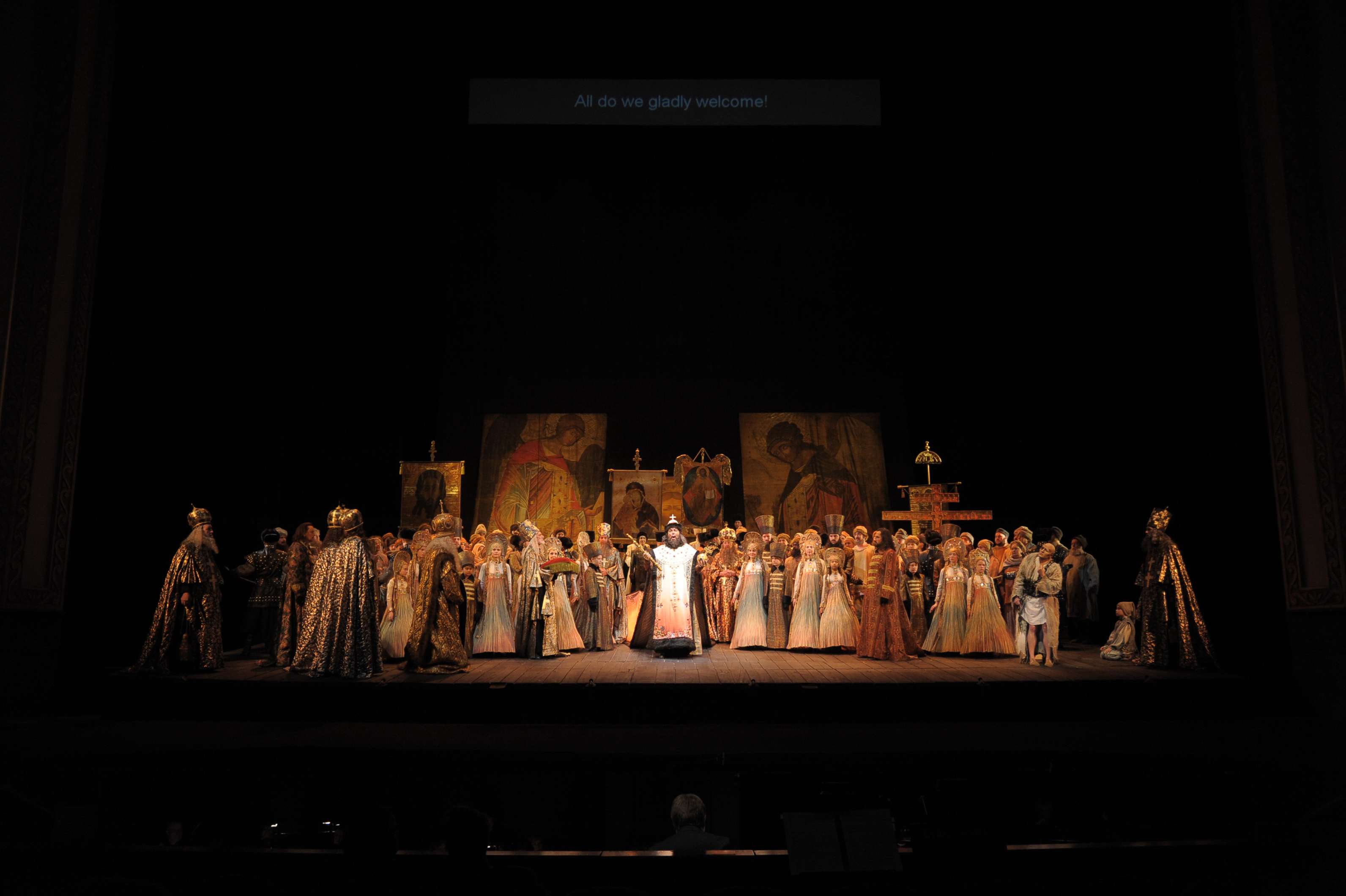|
Back
Ferruccio Furlanetto: A Czar For All Ages Chicago
Lyric Opera
11/07/2011 - & November 11, 17*, 20, 23, 26, 29, 2011
Modest Mussorgsky: Boris Godunov
Stefan Margita (Shuisky), Ferruccio Furlanetto (Boris Godunov), Andrea Silvestrelli (Pimen), Raymond Aceto (Varlaam), Eric Nelson Werner (Grigori), Marianna Kulikova (Inn Hostess), Emily Birsan (Xenia), Emily Fons (Fyodor), Jamie Barton (Nurse), Edward Mout (Holy Fool)
The Chicago Children Chorus, Josephine Lee (Chorus Director), The Lyric Opera Orchestra and Chorus, Michael Black (Chorus Master), Sir Andrew Davis (Conductor)
Julia Pevzner (Director), Göran Wassberg (Set Designer), Kari Gravklev (Costume Designer), Duane Schuler (Lighting Designer)

(© Dan Rest/Lyric Opera Chicago)
Boris Godunov, the most Russian of operas, returned to the Lyric Opera after an absence of 17 years. Ferruccio Furlanetto, who has conquered Rome, Milan, Venice, Florence, Vienna, and St. Petersburg in the role, made his long overdue debut. Why he has been so successful is immediately apparent. A large man, with a commanding stage presence, he sings his lyric lines with great beauty and feeling. He moves with the music to help us understand this complex figure in Russian history.
The dark side of leadership succession is compacted based on a play by Pushkin, who depended heavily on Karamzin's History of the Russian Empire, as does the opera. Long ago, Boris killed Dmitri, second son of Ivan the Terrible and his heir apparent. Mussorgsky, after an overture colored dark and medieval, first shows us Boris saying no to the throne.
Without help from a wife who Mussorgsky cut to keep the opera's length manageable, Boris works to insure the succession of his young son. Furlanetto captures all the complexities of this majestic character. Through tone and dynamics, he deploys a wide range of emotion in a large, rich voice. His tender and wounded side is not recessive as he whispers agony and heart-rending grief and guilt, but rather expresses feelings so unbearable that they must be shushed.
What is more difficult to understand is Boris' desire for power and the cruelty that drove him to kill the young Dmitri. Perhaps Furlanetto has difficulty with the darker side of the character. He did as King Philip. Yet, his strong physical presence masks this problem, and his stunning performance moves throughout to captivate.
In Boris' mad scene, Furlanetto is unconflicted, wishing to give all to his son and heir. Here he feels, as he should, like the unnamed narrator of Edgar Allan Poe's The Tell Tale Heart, whose guilt is manifested by an hallucination that the murdered man's heart continues to beat.
Furlanetto has compelling interplay with his children. Emily Birsan sings Xenia beautifully. Fyodor portrayed admirably by Emily Fons in a trouser role.
The Fool, as always, is the wise man sung with beguiling poetry and sincerity by Edward Mout. He cries for his beloved country and retrospectively we realize that his plaint will be echoed over and over again in Russia, even to today.
The setting, a molded sweep of wood-like material, which extends from stage front to the top of the rear stage is plainly dramatic. From its surface, doors, windows and cellars open up like an Advent card. Since the stage is often crowded with figures, the duma, the people, a tavern group, all bustling with activity, the set itself does not overcrowd the eye or distract from the power of the music.
First rate performances by other cast members flesh out the production. Stefan Margita, as Shuisky, the Rahm Emanuel/Rasputin of the court and the man who would be czar, has a lively, and yet legato tenor with a searing edge.
Andrea Silvestrelli gives us a rich Pimen. Perhaps because he had to reach in a range higher than the ordinary for the bass, his voice sometimes had a rough edge, which suited his music and the role. Pimen is a story teller, reporting details of the young Czar Dimtri's death to Grigori, a young monk who escapes the monastery to take on the role of pretender Czar and a makes a successful run at the throne. Later in the opera, Pimen drives Boris around the bend as he tells of a blind shepherd healed in the presence of the 'dead' Dmitri. Silvestrelli sings these tales with intense drama.
Eric Nelson Werner, as Grigori the pretender, sang with a ping in his lilting lyric lines. The Lyric chose to present the original 1869 version of the opera, which does not include the intense scenes with a Lady Macbeth-like character that won’t have Grigori unless he is Czar. Yet Werner sang winningly, and had the best Russian diction of all the performers.
In conducting Sir Andrew Davis did not portray the brutal, medieval character of the Russian regime, which Mussorsky worked so hard to compose. This is not a nice opera, and while the music is often wrenchingly beautiful, it is at best harsh and cruel. Scenes one through five which preceded the first intermission seemed too delicate to my ear. Things improved for the sixth and seventh scenes with more wild passion on display.
This bold, big production had three wonderful leading bass roles, including Raymond Aceto as Varlaam. There were 72 fake beards, 274 costumes for a cast of 163, 40 pounds of weight in the robe Boris wears for his coronation, 90 adult chorus members, 24 children, and 70 pairs of kneepads for chorus members who spend a lot of time on the ground. The costumes and the lighting added to the dazzle of the court scenes and darkened the foreboding tavern and monastery scenes.
A Boris for the ages in the portrayal by Ferruccio Furlanetto, who is heralded even in Russia as a great Czar.
Susan Hall
|